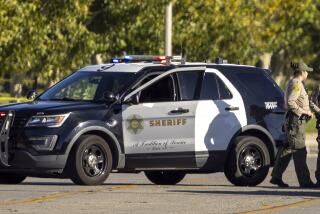A Double Life in Lynwood : Law enforcement: Residents of the former ‘All-American City’ are divided in their view of local sheriff’s deputies. Some officers are being sued for alleged brutality.
- Share via
John Moore, a self-employed millwright, was working on a car in the back yard of his Lynwood home last January when he heard a noise. He said he looked up, straight into the barrel of a 9 m.m. pistol gripped by a Los Angeles County sheriff’s deputy who cursed him and accused him of having stolen the car.
Moore, 49, who has lived in the same Lynwood home for 22 years, said he proved that he owned the car and was not arrested. But he still seethes at the memory.
“They ain’t nothing but a bunch of Wyatt Earps. They treat us like dogs,” he said of his community’s relationship with the deputies sworn to protect it.
But for every resident like John Moore, there are others in Lynwood who look upon their police force with gratitude.
“The Sheriff’s Department is doing a fine job--an outstanding job,” said Larry Young, 67, a retired salesman who has lived in Lynwood for 37 years. “If you made a call to them right now, you’d have 10 units here in the blink of an eye. That’s how good they are.”
Lynwood’s largely black and Latino population appears divided over the conduct of the local sheriff’s station, the target of a massive federal class-action lawsuit filed this week by 81 Lynwood residents, most of them black or Latino.
The suit accuses 22 deputies of a wave of beatings, shootings and other instances of excessive force during a three-month period early this year. Lynwood deputies refused to comment on the allegations, but Sheriff Sherman Block said the allegations were ludicrous and an attempt by gang members to discredit his department.
The department has policed Lynwood on a contract basis since 1977.
This blue-collar community of 55,844 about eight miles south of downtown once was so unified and prosperous that it was named an “All-American City.”
Today it is beset by crime and gang warfare that make it a particularly tough area to police.
City officials insist that those who criticize deputies are still in the minority.
Brutality, said City Manager Charles G. Gomez, is in the eye of the beholder. “You speak to one citizen and he’ll tell you, ‘I’m glad the sheriffs are out there banging heads.’ ” Another, he said, will accuse deputies of brutality.
“I don’t believe there is any more police brutality in Lynwood than anywhere else,” said City Councilman Paul Richards.
The jurisdiction of the Lynwood Sheriff’s Station is a 7.6-square- mile area of 87,700 people, including all of Lynwood and parts of Compton and Willowbrook. So far this year, the station has handled 26 gang-related homicides, more than any of the 23 other sheriff’s jurisdictions in the county, said Lt. Michael Savidan, who heads the Lynwood gang detail.
Deputies have identified 26 gangs with 2,756 members in the station’s jurisdiction. Another 36 gangs with an additional 11,500 known members operate in adjoining areas, drifting in and out of Lynwood, Savidan said.
Generally black gangs clash with black gangs and Latino gangs with Latino gangs, but there are occasional interracial hostilities, he said. On Sept. 11, a 2-year-old Lynwood boy playing in front of his house was wounded when he was caught in the cross-fire between black and Latino gang members.
Moore, who lives less than a block from the wounded boy, said he does not spend much time in his front yard anymore--drive-by shootings make it too risky. And parents of black children generally keep their children away from the local park, he said, because it is dominated by Latino gangs.
Lynwood drugstore clerk Mayte Villalpando said she believes that deputies need to be tough because violence is an everyday reality in Lynwood.
“It’s a hard place here. It’s real dangerous. Lots of gangs, prostitutes and drug dealers,” said Villalpando, 21. “Brutality probably happens but when the police can’t control the people, that’s what they have to do. If they don’t have control, who does?”
A group of paramedics having breakfast Thursday at Vasilio’s Family Restaurant echoed Villalpando’s view. Art Dominguez noted that the ambulance crews deal daily with shootings, stabbings, assaults, heroin overdoses and gang violence, but they have witnessed no brutality by deputies.
Lynwood once was a more placid place, residents recall. In 1961, it was named an “All-American City” by the Freedoms Foundation of Valley Forge, Pa. President John F. Kennedy sent a congratulatory telegram and then-Gov. Edmund G. Brown Sr. arrived to personally honor the community. Lynwood had its own police department with officers who were so public-relations conscious that they gave out candy to children, residents recall.
Then came the 1965 riots in nearby Watts, and some whites moved away, said City Manager Gomez.
The Century Freeway further altered the town. According to an official Lynwood history, the freeway project left a swath of condemned homes and businesses, which attracted vandals and vermin.
“That just changed the town entirely,” said Bea Dobbins, a secretary for the Lynwood Chamber of Commerce. The freeway still is not finished and completion is not expected until 1993, officials said.
Today, the city’s ethnic makeup is 19% Anglo, 34% black, 43% Latino and 4% other and the median household income is $15,799, according to a 1989 Chamber of Commerce survey. The transition has continued today with blacks increasingly being replaced by Latinos, officials said.
The city is filled with small, neatly tended houses, though a few areas are shabby and marred by graffiti. Lacking is the burned-out look of areas such as Watts.
Its major thoroughfares are dotted with bakeries, restaurants and other shops and a few large supermarkets and stores. The city’s industrial district is devoid of smokestacks, populated instead by clothing manufacturers, high-technology metal finishers, toolmakers and Jorgensen Steel.
Despite the problems, Marilyn Cabaret said she has no plans to move away.
Cabaret, a clerk in the city’s business license bureau, grew up poor with the aspiration of someday moving to Lynwood, where her mother worked as a cleaning woman. She achieved her goal in 1958.
“I adore Lynwood,” Cabaret said. “It’s less affluent now but the people are just as nice.”
More to Read
Sign up for Essential California
The most important California stories and recommendations in your inbox every morning.
You may occasionally receive promotional content from the Los Angeles Times.













